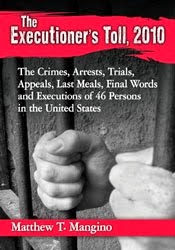Virginia, a state that has executed more
prisoners than any other in the country, appears poised to eliminate the
death penalty — a seismic shift for the state legislature, which just five
years ago looked to the electric chair and secret pharmaceutical deals to keep
the ultimate punishment alive, reported the Washington Post.
The former capital of the Confederacy would become
the first Southern state to abolish capital punishment if a bill on track to
pass the Senate gets out of the House and over to the desk of Gov. Ralph
Northam (D), who has promised to sign it.
A ban in Virginia could help sweep in change across
the South, according to experts who say racial disparities in the death
penalty’s application have roots in the region’s history of slavery and Jim
Crow segregation.
“Just as Confederate monuments are being dismantled,
this vestige of Confederate law is also facing dismantling,” said Robert
Dunham, executive director of the Death Penalty Information Center. “That historical context
is a central part of the repeal. And repeal offers a real opportunity for
racial healing.”
As recently as last year, as Democrats took full
control in Richmond for the first time in a generation and ushered in vast
changes on many fronts, efforts to ban or restrict the death penalty sputtered.
Bills to ban execution failed. A more modest
effort, to prohibit it in cases of severe mental illness, cleared the Senate
with hefty bipartisan support. But a House subcommittee led by a Democratic
prosecutor let that and other death penalty bills die without a hearing.
This year, with the outgoing governor making
abolition a priority, the same prosecutor, Del. Michael P. Mullin (D-Newport
News), is sponsoring a bill to scrap capital punishment entirely.
“I think the
prospects are excellent that we’re going to end the death penalty in 2021,”
said Mullin, a criminal prosecutor for the city of Hampton who heads the
subcommittee that hears proposals to change the criminal code.
Mullin’s bill has not advanced yet, but a version
sponsored by Sen. Scott Surovell (D-Fairfax) has cleared one Senate committee
and is expected to pass a second, which will review its fiscal impact. The
measure appears to have the votes to pass the full Senate.
While Mullin credits Northam’s leadership for the
change, death penalty experts say Virginia’s effort dovetails with a national
shift away from executions, in both law and practice.
Advances in DNA technology, which have exposed 174
wrongful death row convictions since 1973, have prompted some states to ban the
practice over time. More recently, remaining death penalty states have
struggled to carry out executions because of a scarcity of lethal injection
drugs.
The abolition movement has taken hold in Virginia
amid calls for racial justice. Nationally, non-Whites account for a
disproportionate 55 percent of inmates on death row, according to the American
Civil Liberties Union.
Video of George Floyd, an unarmed Black man, dying under the knee of
a White police officer in Minneapolis in May led to protests and criminal
justice overhauls in Virginia and across the nation. Images of mostly White
supporters of President Donald Trump storming the Capitol this month with
limited pushback from police illustrated, for some, how racial bias warps the
administration of justice.
Those events could boost the repeal efforts in
Virginia, as well as the broader criminal justice overhaul that Democrats began
in a summertime special session and continue to push in the regular session
that began this month. But a handful of other bills could cost Democrats some
GOP support.
Sen. William M. Stanley (R-Franklin), a longtime
execution foe, signed on as a chief co-sponsor of Surovell’s bill and
voted for it in committee Monday. But Stanley said he will yank his support if
the legislature votes to eliminate mandatory minimum sentences. He wants the
death penalty to go away, but only if the worst offenders receive mandatory
life sentences, with no chance for parole.
“If there’s
somebody who murders multiple people or a cop, they should never see the light
of day,” he said. “You can say, ‘Life without parole,’ and then [with] no
mandatory minimum, it defeats the whole purpose.”
If the Democrats who control the House and Senate
stick together, they do not need GOP votes to abolish the death penalty. But
Democrats might benefit politically from a bipartisan vote, since that would
make it harder for Republicans, who have leaned heavily on law-and-order issues
in this year’s gubernatorial race, to use abolition to paint them as soft
on crime.
Last year, the 28 states that have the death penalty
carried out a combined 17 executions, a 37-year low. That drop was attributed
in part to the coronavirus pandemic, as officials deemed
executions a health risk for those involved. But the pace had been slowing even
before the health crisis, in large part due to the unavailability of lethal
injection drugs.
At the same time, the Trump administration went in
the opposite direction, resuming federal executions after a 17-year pause. In
Trump’s final six months, the federal government carried out 13.
The death penalty has had a strong connection to the
commonwealth’s history of racial injustice. State law used to differentiate
capital and non-capital crimes based on the race of the perpetrator and the
race of the victim. Once that discrimination was declared unconstitutional, it
persisted in practice due to the discretion afforded all-White
juries, said Dunham, of the Death Penalty Information Center.
From 1900 to 1969, he said, Virginia did not execute
a single White person for any offense that did not result in death, while 73
Black men were executed for rape, attempted rape or robbery.
State Sen. Scott Surovell (D-Fairfax) believes his
bill to eliminate the death penalty in Virginia has enough support to pass the
state Senate. (Bob Brown/AP)
Those disparities persist, Surovell said.
“You’re more likely to get charged with a capital
crime and found guilty of one if you’re a minority, suffer from mental illness,
you’re low-income, you’ve got diminished intellectual capacity, or if you kill
a White person and you’re not White,” he said.
Surovell said that with the death penalty still on
the books, Virginia is “out of step with the rest of the world.”
“The countries that are still utilizing this
punishment are places like Pakistan, Saudi Arabia, Egypt, China and, for a
while, [the Islamic State],” he said. “Most Western industrialized democracies
have moved on.”
Colorado eliminated the death penalty last year,
becoming the 22nd state to do so. The trend has been spreading toward Virginia,
from New England down the Atlantic Coast to Delaware and neighboring
Washington, D.C., and Maryland, which abolished the death penalty in 2013. But until recently,
Virginia lawmakers seemed content to buck it.
The Republicans who controlled the state House and
Senate in 2016 passed a bill that would make the electric chair Virginia’s default method of execution.
Under the law then, as now, condemned inmates can choose the method of
execution: lethal injection or the chair. (The last inmate to pick
electrocution in Virginia was Robert Gleason Jr. in 2013.)
In 2016, execution drugs had become scarce, with
pharmaceutical companies pressured by death penalty foes to stop selling them.
The bill would have let the state use the electric chair when it could not
obtain the drugs. When it got to the desk of then-Gov. Terry
McAuliffe, the Democrat called it “reprehensible” and gutted the
bill, but in a way that allowed the state to carry on with executions by specially
ordering execution drugs from compounding pharmacies. The
pharmacies’ identities were to be kept secret to shield them from political
pressure.
The plan was controversial not only among death
penalty opponents but also among right- and left-wing critics of government
secrecy. But it passed with help from conservative Democrats and became law.
Newly empowered Democrats repealed that law last
year. But that was the only action they took on the death penalty over the
course of a 65-day regular session and a marathon 84-day special session
called, in part, to address racial injustice.
As the once solidly conservative state has become
more urbanized, racially diverse and socially liberal, opposition to capital
punishment has shifted from a political liability to a potential asset.
McAuliffe won the governor’s race in 2013 on a promise to uphold executions as
a matter of state law, despite his personal opposition as a Catholic. This
year, he and every other Democrat running for governor are calling for
abolition of the death penalty.
The shift against the death penalty has not
been welcomed by law enforcement groups. Wayne Huggins, executive director of
the Virginia State Police Association, said repealing the death penalty would
be an insult to the families of slain officers, particularly if paired with
bills to reinstate parole and eliminate mandatory minimums.
“From our perspective, it’s injustice,” Huggins, who
testified against the bill Monday, said later in an interview. “It sends a
terrible message to society in general and the law enforcement community in
particular.”
But some of the state’s prosecutors, who have
traditionally sided with law enforcement on the death penalty, have lined up
this year in favor of repeal.
Attorney General Mark R. Herring (D), who as a state
senator in 2007 also voted for the “triggerman” expansion, is advocating repeal
as he seeks a third term this year. Surovell’s bill also has support from about
a dozen of the state’s commonwealth’s attorneys, who last summer formed the group
Virginia Progressive Prosecutors for Justice and represent 40 percent of the
state’s population.
In some ways, the political shifts are only catching
up with public sentiment. A November 2019 Gallup poll found that for the first time in 34
years, a
majority of Americans said life imprisonment with no possibility of
parole was a better punishment for murder than the death penalty.
No jury in Virginia has imposed a death sentence
since 2011. The state has not executed anyone since 2017, when it put two
people to death.
Senate Majority Leader Richard L. Saslaw
(D-Fairfax), a longtime death penalty supporter, still backs its use for mass
murderers. But he had no reservations about voting for Surovell’s bill in
committee Monday because the death penalty is effectively all but gone in
Virginia anyway.
“There’s only two people on death row; juries are
just not handing out the sentences anymore,” he said. “That option’s not there
right now.”
Sen. Chap Petersen (D-Fairfax City) first won
election to the legislature 20 years ago, as a wave of sniper
shootings had terrorized the Washington region — crimes that led him to
believe “there are times when the death penalty can be an option.”
Yet he, too, voted for Surovell’s bill in committee.
Petersen said he got on board with abolition this year not because of any shift
in his personal beliefs, but because he knows that’s what his changing Northern
Virginia district clearly wants.
“I don’t change my opinion on a lot of issues,” he
said. “But on that one, I bowed to an emerging social consensus.”
To read more CLICK HERE







